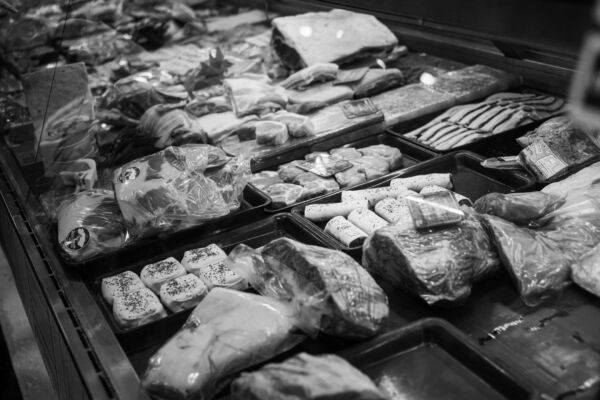3 Foods to Avoid to Reduce Cancer Risk and What to do Instead
by Tuesday Hoelscher

There is so much information, and misinformation out there about what foods you should avoid to decrease cancer and recurrence risk, but there’s actually only a few foods that have actually been shown to increase cancer risk.
Alcohol
Alcohol is considered a class 1 carcinogen which means we have sufficient evidence to show that it certainly causes at least 6 different types of cancer: mouth and throat, larynx, esophagus, colon and rectum, liver, and breast in women¹ ².
So What Can You Do Instead?
Limit consumption as much as you can. The less alcohol the better. Try limiting your consumption to special events or in social settings. Another tip is to drink a glass of water in between every alcoholic beverage. This will cut the amount of alcohol you drink in half. More alcohol brands are coming out with alcohol-free options recently, so try out some non-alcoholic beer, wine, or cocktails in place of alcoholic beverages.
Processed Meat
Processed meats, like alcohol, are considered a class 1 carcinogen. They are defined as meats having been preserved by smoking, curing, or salting, or having added chemical preservatives. Some examples include: bacon, deli meat, hot dogs, sausages, beef jerky, and pepperoni. Eating even a small amount of processed meats on a regular basis increases the risk of colorectal cancer³.
So What Can You Do Instead?
Some healthy swaps you can make instead of consuming processed meats include chicken, turkey, and seafood. You can also try to limit your intake of processed meats to special occasions where processed meat is prepared and served by others. If you are going to buy deli meat, buy it from the deli section where the meat is cut right of the animal versus buying pre-packaged deli meat. Also, be cautious at breakfast. Most “breakfast meat” is processed. Opt for other protein options at breakfast such as eggs, yogurt, or cottage cheese.
Red Meat
Research shows that over consumption of red meat increases the risk of colorectal and possibly pancreatic and prostate cancers. However, it is considered a class 2a carcinogen which means it “probably” causes cancer but we don’t have sufficient evidence to say for sure. There is no studies that show the exact amount of red meat we should be eating, however The American Institute for Cancer Research recommends eating less than 18 ounces of red meat per week, which is about 3 servings 4,5.
Examples of red meat includes: cow, pig, lamb, deer, bison, buffalo, and most other big game. Some healthier alternatives are plant based proteins such as tofu, beans, and legumes.
So What Can You Do Instead?
Plan ahead when it comes to your protein intake. Keep your red meat servings to 3 servings per week if possible. You can also try a meatless Monday or aim for one meatless meal each day. This not only decreases your red meat intake, but will increase your plant intake which is very beneficial for your health given the fiber, vitamin and mineral, and antioxidant content.
Ultimately, the decision is yours on how much of these foods you want to consume. It is good to be mindful of these risk increasing foods so you can make informed choices, but if these are some of your favorite foods and beverages, know it is okay to consume in moderation from time to time if it improves the quality of your life.
Consider quality of life when deciding to cut back or eliminate any foods. You didn’t go through treatment to never be able to have a glass of champagne with your friends on your birthday!
References:
- 2025, April 29. Alcohol and Cancer Risk. https://www.hhs.gov/surgeongeneral/reports-and-publications/alcohol-cancer/index.html
- Rumgay H, Murphy N, Ferrari P, Soerjomataram I. Alcohol and Cancer: Epidemiology and Biological Mechanisms. Nutrients. 2021 Sep 11;13(9):3173. doi: 10.3390/nu13093173. PMID: 34579050; PMCID: PMC8470184.
- Händel MN, Rohde JF, Jacobsen R, Heitmann BL. Processed Meat Consumption and the Risk of Cancer: A Critical Evaluation of the Constraints of Current Evidence from Epidemiological Studies. Nutrients. 2021 Oct 14;13(10):3601. doi: 10.3390/nu13103601. PMID: 34684602; PMCID: PMC8537381.
- Sivasubramanian BP, Dave M, Panchal V, Saifa-Bonsu J, Konka S, Noei F, Nagaraj S, Terpari U, Savani P, Vekaria PH, Samala Venkata V, Manjani L. Comprehensive Review of Red Meat Consumption and the Risk of Cancer. Cureus. 2023 Sep 15;15(9):e45324. doi: 10.7759/cureus.45324. PMID: 37849565; PMCID: PMC10577092.
- 2025, April 29. Limit Consumption of Red and Processed Meat. https://www.aicr.org/cancer-prevention/recommendations/limit-consumption-of-red-and-processed-meat/
Tuesday is a registered dietitian nutritionist who helps people with cancer thrive during treatment, reduce recurrence risk, and eat with less stress and fear so that they can get their energy back and feel like themselves again. To schedule an appointment or access free resources, please visit tuesdayhoelscher.com.
Images: From Unsplash and Pexels
The Site is not intended to be a substitute for professional advice. Under no circumstances will we be liable for any loss or damage caused by your reliance on information obtained through the Site. You are responsible for evaluating the accuracy, completeness, or usefulness of any information, opinion, advice, or other content available through the Site. Please seek the advice of professionals, as appropriate, regarding the evaluation of any specific information, opinion, advice, or other content. Never disregard professional advice, including medical advice, or delay in seeking it because of something you have read on this Site.

